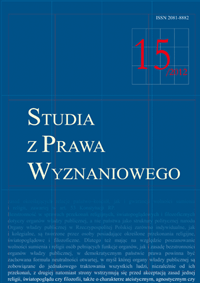Wolność sumienia i religii nieletnich przestępców w zakładach poprawczych i schroniskach dla nieletnich
Freedom of Conscience and Religion of Juvenile Delinquents Residing in Correctional Facilities and Juvenile Shelters
Author(s): Jerzy NikołajewSubject(s): Law, Constitution, Jurisprudence
Published by: Katolicki Uniwersytet Lubelski Jana Pawła II - Wydział Prawa, Prawa Kanonicznego i Administracji
Keywords: Freedom of conscience and religion; juvenile delinquents secure detention centre; secure confinement centre
Summary/Abstract: The subject of the analysis is freedom of conscience and religion of juvenile delinquents. At first the author discusses juvenile delinquents and places where they undergo punishment. He names types of youth detention centres listing rights provided to the youth in each of them. Further on he analyses freedom of conscience and religion in general and defines freedom of religion, freedom of conscience, freedom of belief. Next the subject of the article are special rights of juveniles that are the consequence of legislative and executive regulations describing such issues as follows: the right of juveniles to practice their faith and participate in religious services, to listen to religious ceremonies to posses religious objects used in worship, to participate in religious classes in charity and social activity of religious communities and to individual meetings with a priest or any other clergyman. Further on the author discusses the limitations of freedom of conscience and religion of juvenile delinquents. Those connected with the isolating character of the prison, together with the rule of tolerance and the rule of non interruption of the order in prison. The next part of the article is dedicated to the institution of the prison chaplain in reference to the regulations of canon law, employment conditions and range of responsibilities. The author also compares the religious privileges of adult imprisoned to juvenile offenders and points to an almost identical legal status of the two groups. The article is summed up by legislative demands such as providing new regulations for the issues of freedom of conscience and religion in a way that would be adapted to the needs of juvenile offenders and were not a mere copy of rights of adolescent criminals. The regulations should be specific rather than general in character they should also eliminate illegal religious practices in a broad sense. The next point is to mitigate the law restricting freedom of conscience and religion in respect to the rule of tolerance and the need not to interrupt order in prison moreover it is suggested to extenuate much too complicated general rules connected with the need to obey the rights of juvenile offenders and the need of correct functioning of secure detention and secure confinement centres for juveniles. Modifying the regulation enabling listening to religious ceremonies only would be reasonable. There should also be a change in the range of religious privileges of young offenders from taxative to exemplified one. Employment conditions of institutional prison chaplains need changing as well.
Journal: Studia z Prawa Wyznaniowego
- Issue Year: 2012
- Issue No: 15
- Page Range: 157-184
- Page Count: 28
- Language: Polish

